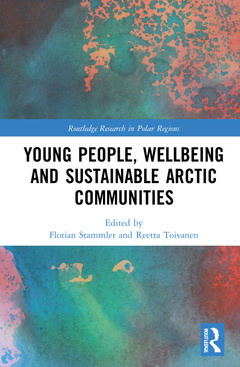Young People, Wellbeing and Sustainable Arctic Communities Routledge Research in Polar Regions Series
Coordonnateurs : Stammler Florian, Toivanen Reetta

Youth are usually not (yet) decision makers in politics or in business corporations, but the sustainability of Arctic settlements depends on whether or not youth envision such places as offering opportunities for a good future. This is the first multidisciplinary volume presenting original research on Arctic youth.
This edited book presents the results of two research projects on youth wellbeing and senses of place in the Arctic region. The contributions are united by their focus on agency. Rather than seeing youth as vulnerable and possible victims of decisions by others, they illustrate the diverse avenues that youth pursue to achieve a good life in the Arctic. The contributions also show which social, economic, political and legal conditions provide the best frame for youth agency in Arctic settlements.
Rather than portraying the Arctic as a resource frontier, a hotspot for climate change and a place where biodiversity and traditional Indigenous cultures are under threat, the book introduces the Arctic as a place for opportunities, the realization of life trajectories and young people?s images of home. Rooted in anthropology, the chapters also feature contributions from the fields of sociology, geography, sustainability science, legal studies and political science.
This book is intended for an audience interested in anthropology, political science, Arctic urban studies, youth studies, Arctic social sciences and humanities in general. It would attract those working on Arctic sustainability, wellbeing in the Arctic, Arctic demography and overall wellbeing of youth.
Introduction
The Quest for a Good Life: Contributions from the Arctic towards a Theory of Wellbeing
Florian Stammler & Reetta Toivanen
Part I: Movement and Emplacement
- Motives for Migrating among Youth in Russian Arctic Industrial Cities
- Not Wanting to be "Stuck": Exploring the Role of Mobility for Young People’s Wellbeing in Northern Finland
Anna Simakova, Maria Pitukhina & Aytalina Ivanova
Teresa Komu & Ria-Maria Adams
3. Leaving or Staying? Youth Agency and the Livability of Industrial Towns in the Russian Arctic
Alla Bolotova
Part II: Youth Agency for the Future: Alternatives and Livelihoods
4. Towards a Sustainable Future of the Indigenous Youth: Arctic Negotiations on (Im)mobility
Reetta Toivanen
5. Youths’ and Their Guardians’ Prospects of Reindeer Husbandry in Finland
Tanja Joona & Pigga Keskitalo
6. Indigenous Youth Perspectives on Extractivism and Living in a Good Way in the Yukon
Susanna Gartler with Taiya Melancon & Eileen Peter
Part III: Regulating Youth’s Paths to Independence
7. Youth Law, Policies and Their Implementation in the Russian Arctic
Aytalina Ivanova, Tatiana Oglezneva & Florian Stammler
8. The Quest for Independent Living in Finland: Youth Shelter as a Critical Moment in Young Adults’ Life Courses Miia Lähde & Jenni Mölkänen
9. Planning for the Future: Future Orientation, Agency and Self-Efficacy of Young Adults Leaving Care in the Russian Arctic
Meri Kulmala & Anna Fomina
10. Youth Well-being in "Atomic Towns": The Cases of Polyarnye Zori and Pyhäjoki
Ria-Maria Adams, Lukas Allemann & Veli-Pekka Tynkkynen
Florian Stammler is Research Professor at the University of Lapland’s Arctic Centre (Finland), and coordinates its anthropology team. He led the WOLLIE project consortium "Live, Work or Leave? Youth - wellbeing and the viability of (post) extractive Arctic industrial cities in Finland and Russia"
Reetta Toivanen is a Professor of Sustainability Science at the Helsinki Institute of Sustainability Science (HELSUS), Docent in Social and Cultural Anthropology and the Vice-Director of the Centre of Excellence in Law, Identity and the European Narratives. She is based at the University of Helsinki, Finland.
Date de parution : 05-2023
15.6x23.4 cm
Date de parution : 09-2021
15.6x23.4 cm
Thème d’Young People, Wellbeing and Sustainable Arctic Communities :
Mots-clés :
Young People; arctic communities; Young Man; arctic youth; Russian Arctic; arctic young people; Good Life; arctic people; Single Industry Towns; arctic wellbeing; Reindeer Herding; arctic placemaking; Murmansk Region; sustainability in the arctic; Indigenous Youth; sustainable arctic communities; Arctic Russian Regions; everyday life in the arctic; Russian Federation; arctic lifecourse; UN; Yamal Nenets Autonomous District; Arctic; Arctic Zone; Krasnoyarsk Territory; Youth Outmigration; Chukotka Autonomous Districts; Youth Wellbeing; Social Wellbeing; Involuntary Immobility; Social Science Research; Reindeer Husbandry; Dominant Societal Discourses; Young People’s Wellbeing; Young Adults



